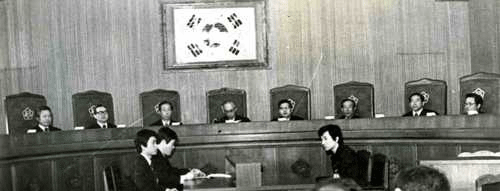hankyoreh
Links to other country sites 다른 나라 사이트 링크
Supreme Court denies damages to victims of military dictatorship-era illegal detention

The Supreme Court ruled that the state has no obligation to compensate victims of illegal detention in connection with the Democracy Youth and Student League (DYSL) case of 1974.
While the court’s decision was made on the period when damages could be claimed having passed, critics blasted it as ignoring the state’s responsibility for an unfortunate historical episode.
The Supreme Court’s first division announced on Apr. 7 that it had overturned a previous ruling ordering the state to pay 1.095 billion won (US$943,000) in compensation to 29 victims in the DYSL case, including Catholic University of Korea professor Ahn Byung-wook, 68. The case has been remanded to Seoul High Court.
In 1974, Ahn and the other 28 plaintiffs were arrested without warrants and detained illegally for as long as 141 days before their indictments were ultimately suspended. Around 180 students were arrested and indicted at the time by the regime of then-President Park Chung-hee (1961-79) for allegedly being manipulated by “subversive forces” into attempting to “overturn the state.”
A reinvestigation of the DYSL case by the Truth and Reconciliation Commission resulted in a Dec. 2005 announcement calling the episode a “distorted suppression of the student movement.”
Ahn and the other plaintiffs filed their case against the state in 2012 after the Supreme Court ruled on Dec. 16, 2010, that the first of the Emergency Measures was unconstitutional and invalid.
“Given that more than 37 years passed between the illegal arrest and detection and the filing of the lawsuit, it cannot be concluded that the victims had objective grounds impeding them from exercising their claim for damages against the state,” the court ruled in siding with the state.
“The state’s argument that the statute of limitations has expired cannot be called an abuse of authority and violation of the principle of good faith simply because the state has an obligation to protect its citizens,” it continued.
In the first trial of the case, the court sided against the plaintiffs based on a three-year statute of limitations from the date damages were confirmed with the Truth and Reconciliation Commission’s Dec. 2005 announcement of its findings on the DYSL case. The court in the second trial argued that the statute of limitations should be calculated from Dec. 2010, the date of the Supreme Court ruling finding the Emergency Measures unconstitutional and invalid, and that the state was therefore liable for damages. The latter ruling also took into account the fact that the plaintiffs had not been able to file suit against the state earlier.
By Heo Jae-hyun, staff reporter
Please direct questions or comments to [english@hani.co.kr]

Editorial・opinion
![[Column] Park Geun-hye déjà vu in Yoon Suk-yeol [Column] Park Geun-hye déjà vu in Yoon Suk-yeol](https://flexible.img.hani.co.kr/flexible/normal/500/300/imgdb/original/2024/0424/651713945113788.jpg) [Column] Park Geun-hye déjà vu in Yoon Suk-yeol
[Column] Park Geun-hye déjà vu in Yoon Suk-yeol![[Editorial] New weight of N. Korea’s nuclear threats makes dialogue all the more urgent [Editorial] New weight of N. Korea’s nuclear threats makes dialogue all the more urgent](https://flexible.img.hani.co.kr/flexible/normal/500/300/imgdb/original/2024/0424/7317139454662664.jpg) [Editorial] New weight of N. Korea’s nuclear threats makes dialogue all the more urgent
[Editorial] New weight of N. Korea’s nuclear threats makes dialogue all the more urgent- [Guest essay] The real reason Korea’s new right wants to dub Rhee a founding father
- [Column] ‘Choson’: Is it time we start referring to N. Korea in its own terms?
- [Editorial] Japan’s rewriting of history with Korea has gone too far
- [Column] The president’s questionable capacity for dialogue
- [Column] Are chaebol firms just pizza pies for families to divvy up as they please?
- [Column] Has Korea, too, crossed the Rubicon on China?
- [Correspondent’s column] In Japan’s alliance with US, echoes of its past alliances with UK
- [Editorial] Does Yoon think the Korean public is wrong?
Most viewed articles
- 1[Column] Park Geun-hye déjà vu in Yoon Suk-yeol
- 2Thursday to mark start of resignations by senior doctors amid standoff with government
- 3Will NewJeans end up collateral damage in internal feud at K-pop juggernaut Hybe?
- 4[Guest essay] The real reason Korea’s new right wants to dub Rhee a founding father
- 5Why Korea shouldn’t welcome Japan’s newly beefed up defense cooperation with US
- 6[Editorial] New weight of N. Korea’s nuclear threats makes dialogue all the more urgent
- 7Kim Jong-un expressed ‘satisfaction’ with nuclear counterstrike drill directed at South
- 8[Column] ‘Choson’: Is it time we start referring to N. Korea in its own terms?
- 9N. Korean hackers breached 10 defense contractors in South for months, police say
- 10‘We must say no’: Seoul defense chief on Korean, USFK involvement in hypothetical Taiwan crisis